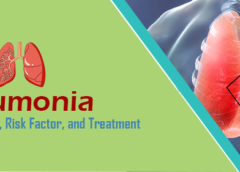Pneumonia is an infection in one or both lungs which inflames the air sacs. The air sacs may fill with fluid or pus (purulent material), causing phlegm or pus cough, fever, chills, and breathing difficulties. A variety of organisms can cause pneumonia including bacteria, viruses and fungi, Pneumonia is a serious lung infection that affects people of all ages, but it is especially risky for older adults and young children. Here we’ll discuss about the Pneumonia and its symptoms and when to see a doctor.
The WHO reports that more than 165 million children worldwide contract pneumonia every year, of which 20 million are hospitalized and 2 million dies.
Pneumonia is the leading cause of death in children below the age of five worldwide. Sub-Saharan Africa is hit overwhelmingly, accounting for over half of these cases.
Pneumonia can range from mild to life-threatening to severe. For babies and young children, people older than 60 years, and people with health problems or compromised immune systems it is most dangerous.
Read Also:Coronaviruses: Symptoms, Treatments, And Prevention
Symptoms of Pneumonia
The pneumonia signs and symptoms range from mild to extreme, depending on factors such as the type of germ that triggers the infection, and your age and overall health. Mild signs and symptoms are mostly similar to cold or flu symptoms but they last longer.
Signs and symptoms of pneumonia may include:
• Chest pain at breathe or coughing
• Confusion or changes in mental awareness Cough that can produce phlegm
• Exhaustion
• Weakness
• Fever
• Lower body temperature
• Nausea
• Shortness of breath
• Vomiting
• Diarrhoea
• Headaches
• Wheezing
Newborns and babies may have no sign of the infection. Or they may vomit, have a fever and cough, appear restless or tired and without energy, or have difficulty breathing and eating.
- When to see a doctor
See your doctor if you have breathing problems, chest pain, persistent fever of 102 F or high, or persistent cough, particularly if you’re coughing up the pus.
Read Also:Swine Flu: Overview, Causes, Symptoms and Prevention
It is especially important that people see a doctor in certain high-risk groups:
• Adults over the age of 65
• Children below the age of 2 with signs and symptoms
• People with a chronic health condition or weakened immune system
• People receiving chemotherapy or taking medication that suppresses the immune system
Pneumonia can become a life-threatening condition for some older adults including people with heart failure or chronic lung problems.
Risk factors of Pneumonia
Anyone may get pneumonia. But the two highest-risk age ranges are:
• Children 2 years of age or younger
• People 65 years of age or older
Other risk factors include:
• To be hospitalized: If you are in a hospital intensive care unit, particularly if you are on a machine that helps you breathe called ventilator you are at a higher risk of pneumonia.
• Chronic disease:. Whether you have asthma, chronic obstructive pulmonary disease (COPD) or heart disease you are more likely to get pneumonia.
• Smoking:. Smoking destroys the body’s natural defenses against the bacteria and viruses that cause pneumonia.
• Weakened or suppressed immune system. There is a high-risk chance for people who have HIV/AIDS, who have undergone an organ transplant, or who undergo chemotherapy or long-term steroids.
Read Also:Cholesterol: Risk Factors, Symptoms, Causes, and Treatment
Treatment of Pneumonia
Treatment options depend on the type of pneumonia―viral or bacterial―that infects an individual with. The antibiotics are used to treated bacterial pneumonia.
If diagnosed early enough, viral pneumonia is treated with antiviral drugs, and antibiotics may be used to avoid secondary infections or complications.
Typically after a question about such symptoms or signs, a doctor may examine the patient. This could involve chest X-rays and a blood test, but more testing may be arranged if the symptoms are bad or if doctors are trying to differentiate between other health problems. Many patients feel better shortly after prescribed medications. If the patient doesn’t feel better after 2 to 3 days of treatment further treatment may be needed. If symptoms are severe or the patient has other serious illnesses a hospital stay might be necessary. Adequate sleep, prevent overexertion, drinking plenty of water and quit cigarette smoke improves recovery.
Prevention
To help prevent pneumonia:
• Vaccinate. There are vaccines available to avoid some kind of pneumonia and the flu. Discuss getting these shots with your doctor. The recommendation for vaccination has changed over time so be sure to confirm your vaccination status with your doctor even if you have a pneumonia vaccine beforehand.
• Make sure kids are vaccinated. Doctors prescribe a specific pneumonia vaccine for children younger than 2 and children between 2 to 5 of age who are at high risk of pneumococcal disease. The vaccine will also be given to the children attending a community child care centre. Doctors also recommend flu shots for children older than 6 months.
• Practice good hygiene. To protect yourself from respiratory infections that sometimes lead to pneumonia, wash your hands frequently or use a hand sanitizer based on alcohol.
• Don’t smoke. If you smoke quit it now. Since smoking destroys your lungs’ natural protection against respiratory infections.
• Keep your immune system strong. Get enough sleep, do daily workout and eat a balanced diet.

Leave a Reply
You must be logged in to post a comment.